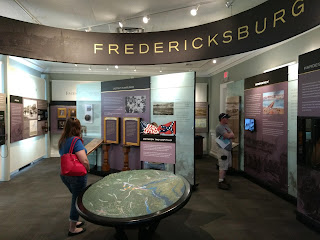My wife and I
recently took a trip to Virginia and Washington, D.C. During that
time, we visited a number of historical sites, including several
Civil War battlefields. As an American History buff, this was like a
dream for me (and my wife actually enjoyed herself there, too!). It
was amazing to follow the route of Grant and Lee’s 1864 Wilderness
campaign, to stand on the ground at Chancellorsville where
“Stonewall” Jackson was shot by his own men (he would die a few
days later), and to walk the Sunken Road at the base of Marye’s
Heights at Fredericksburg.
Fredericksburg was
one of the most interesting sites to us. If you know anything about
the battle that took place there in December of 1862, it was like
Pickett’s doomed charge at Gettysburg in reverse. Instead of
Confederates charging up a hill into the teeth of well-entrenched
Union batteries (as Pickett would later do at Gettysburg in July,
1863), Union infantry at Chancellorsville would charge up a steep
incline to disastrous consequences, as they were pummeled by
Confederate artillery stationed on the top of a ridge called Marye’s
Heights and by Confederate infantry stationed behind a stone wall in
front of the Sunken Road below. It was there that Robert E. Lee was
said to have famously declared, “It is well that war is so
terrible - otherwise we would grow too fond of it.”
While there on the
battlefield, I saw a large bronze statue at the end of the rebuilt
stone wall. Being the only statue on the premises, I was drawn to
see what this unusual site was. It was a monument not to any of the
great generals of the battle, but to an obscure sergeant in the
Confederate Army by the name of Richard Kirkland. Following is an
account of Sergeant Kirkland’s fascinating story:
When night fell after the day’s pitched battle, countless
(overwhelmingly Union) soldiers lay freezing and dying on the ground,
where both sides could clearly hear them crying out for
 |
water, the injured becoming understandably more dehydrated than the healthier men behind cover. Hearing these dying pleas, Confederate soldier Richard Rowland Kirkland, decided to do something about their pain. Kirkland asked the commanding general if he could head out to the battlefield and provide water to the disabled men, but Kirkland was initially denied. However after listening to the men’s cries a while longer, Kirkland pressed the point and the general allowed him to take to the exposed battleground and provide aid. Kirkland’s request to carry a white flag so that he would not be shot by the active Union soldiers was denied. Undeterred, the brave soldier set out with his canteen to soothe the dying men. At first apprehensive, the Union forces soon caught on to his charity and did not fire on Kirkland. The generous soldier was able to make several separate trips out onto the battlefield with water, each time risking being shot by the tense men on either side. Kirkland’s selfless actions earned him the nickname, “The Angel of Marye’s Heights.” (source – Atlas Obscura).
 |
| The Sunken Road...Marye's Heights is on the right... the stone wall on the left |
Think of that! Of
all the stories of bravery and heroism that could be told at this
iconic site, the one that the generation following the war deemed
most worthy to memorialize in bronze was this story of mercy. A
Rebel reaches out a hand of mercy to his Yankee opponents...and is
forever remembered.
This reminds me of a
verse in James:
...judgment without mercy will be shown to anyone who has not
been merciful. Mercy triumphs over judgment. (James 3:13 NIV)
“Mercy triumphs
over judgment.” What a stunning statement! God is indeed a God of
justice, and because He is a just God, no sin can be excused. In
fact, in Romans 1:20, Paul boldly states that all mankind is “without
excuse.” He later states “for all have sinned and fall short
of the glory of God” (Romans 3:23). Yet God’s mercy triumphs
over judgment. The only way for His mercy to triumph over His
perfect justice was for someone to pay the penalty of sin for those
under judgment. Someone had to come over the wall to save us, rebels
though we were. That Someone was God’s only Son, Jesus Christ.
Paul sums this up this way: “God made Him who had no sin to be
sin for us, so that in Him we might become the righteousness of God
(2 Co. 5:21). Jesus Christ did far more than Sergeant Kirkland
did for his enemies, heroic though that action was. Jesus gave His
very life for me and for you. Because of His greatest of all
sacrifices, we now have the opportunity to have fellowship with God
today. As well, we know that we can only receive mercy from God when
we show mercy to others. Let’s follow Richard Kirkland’s example
and show mercy to others today!
This article originally appeared in The Posey County News in my column "Pastor's Perspective."
–-------------------------
Below are a few more pics (and one short video) of our Fredericksburg visit:














No comments:
Post a Comment